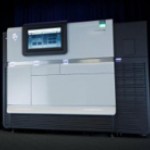pacbio
The long-awaited public stock offer from third-generation sequencing technology company Pacific Biosciences has finally arrived (here's the SEC filing, and coverage from Matthew Herper and GenomeWeb).
PacBio has already raised almost US$400 million in venture capital, and aims to increase this by up to US$200 million from its share offering. The sheer scale of these figures gives you a sense of just how much money is being thrown around in the race towards ever cheaper, faster and more accurate DNA sequencing machines. Of course, whether investors will decide to throw more money in PacBio's…
Dan Koboldt has a very nice recap of the various sequencing technologies presented at last week's Advances in Genome Biology and Technology meeting. I totally agree with his central point:
Something had been bothering me about the sequencing-company presentations this year, and I finally realized what it was. During AGBT 2009, every player was gunning to take over the world. This year it seems like every sequencing platform has a niche in mind.
The recent proliferation of sequencing technologies - each with their own characteristic profile of strengths and weaknesses - has been bewildering…
The main theme of this year's Advances in Genome Biology and Technology meeting should come as no surprise to regular readers: sequencing. Generating as many bases of DNA sequence as quickly, cheaply and accurately as possible is the goal of the moment, and the number of companies jostling to achieve that goal is growing rapidly.
The meeting saw impressive performances from established players in the field, especially Illumina: their new HiSeq 2000 instrument seems to have dug in as the platform of choice for generating vast amounts of high-quality short-read data. Life Technologies…
Stephen Turner from Pacific Biosciences gave a dramatic presentation this afternoon launching PacBio's new third-generation sequencing instrument. The room was packed for the seminar, with a palpable buzz, and Turner's presentation was preceded by a theatrical introduction from PacBio CEO Hugh Martin.
The crescendo of Turner's presentation was the unveiling of a video showing the new (and enormous) PacBio instrument, which has been tucked away in a room here at AGBT and revealed to a trickle of VIPs (including Bio-IT World's Kevin Davies) - if that's the kind of thing you're into,…
I've been remiss in blogging from the Advances in Genome Biology and Technology meeting here in Marco Island, Florida, primarily due to some panic-stricken last-minute changes to the slides for my own presentation last night.
Fortunately the conference has been extremely well-covered by others: Sanger colleague Luke Jostins has blog posts up summarising day 1 and day 2 of the meeting; Dan Koboldt from MassGenomics has his first impressions and a review of the cancer genomics session; and Anthony Fejes is continuing the tradition of publishing extensive notes on every talk he attends. …
The big news from the JP Morgan investment conference today is the announcement of a brand new shiny sequencing machine from Illumina, the HiSeq 2000. The new machine boasts an impressive set of statistics, and looks likely to gradually replace Illumina's GAIIx as the workhorse of most modern sequencing facilities.
So, how excited should we be?
Let's be clear about this up front: this new machine, while impressive, represents an incremental advance rather than a dramatic technological leap forward. This is still second-generation sequencing, generating relatively small snippets of DNA…
Complete Genomics is finally back on the road towards fulfilling its promises of $5000 human genome sequences, after delays in obtaining funding for a massive new facility pushed back its plans by six months. The $45 million in funding it announced this week will be sufficient to build the new Silicon Valley facility, which the company claims will have the capacity to sequence a staggering 10,000 genomes over the course of 2010.
Complete Genomics is an unusual creature in the second-generation sequencing menagerie: instead of aiming to generate revenue by selling machines to researchers…
The announcement of the Helicos genome sequence (which I've already discussed in detail) engendered a huge amount of media interest, sometimes for the wrong reasons.
Having the media attention directed elsewhere in the third-generation sequencing space was clearly an unwelcome experience for Helicos competitors Pacific Biosciences, who have responded with a press release announcing the successful raising of $68M to finance further development of their single-molecule real-time (SMRT) sequencing platform.
To be fair, raising that sort of capital in the current economic climate is no…
Regular readers will know that I'm at the Advances in Genome Biology and Technology (AGBT) meeting this week, one of the most highly-awaited meetings on the genomics calendar.
There's a huge amount of fascinating data being presented (anyone interested in a blow-by-blow account should follow Anthony Fejes' live-blogging), but there's definitely an overarching theme: the evolving battle between the new-technology sequencing companies. This is a competition that most researchers in genomics are watching with great interest, because it promises to bring about very rapid advances in the speed,…
